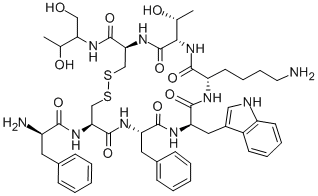PramlintideAcetate , 97% , 196078-30-5
CAS NO.:196078-30-5
Empirical Formula: C173H273N51O56S2
Molecular Weight: 4027.46
MDL number: MFCD08460172
| Pack Size | Price | Stock | Quantity |
| 10mg | RMB5212.00 | In Stock |
|
| others | Enquire |
PRODUCT Properties
| Melting point: | >175°C (dec.) |
| storage temp. | Refrigerator |
| solubility | Acetic Acid (Slightly), DMSO (Slightly) |
| form | Solid |
| color | White to Off-White |
| CAS DataBase Reference | 196078-30-5(CAS DataBase Reference) |
Description and Uses
Pramlintide acetate is an injectable human amylin analog that has been launched for the treatment of both type 1 and type 2 diabetes, in conjunction with insulin. While it is also a 37-amino acid peptide, it differs from its parent predecessor by the substitution of Ala-25, Ser-28, and Ser-29 with prolines. Not only do these modifications improve the solubility of the peptide, they also eliminate the aggregation observed with amylin, resulting in a stable synthetic analog with retention of biological activity that is suitable for pharmaceutical use. As an indication of potency, Pramlintide acetate inhibits the binding of radioiodinated rat amylin to rat nucleus accumbens membranes with a Ki value of 23 pM. Its mechanism of action mimics amylin; as a neurohormone that is cosecreted with insulin from the pancreatic β cells in response to meals, it is involved in glucose homeostasis. Both peptides lower postprandial glucose levels by inhibiting glucagon and by restraining the vagus-mediated rate of gastric emptying, thereby, slowing intestinal carbohydrate absorption. Furthermore, amylin, orPramlintide acetate, has the added benefit of inducing postprandial satiety resulting in weight loss in the patients with type 2 diabetes. Since Pramlintide acetate slows gastric emptying, it is contraindicated in patients with gastroparesis and in patients taking drugs that alter gastrointestinal motility (anticholinergic agents, such as, atropine) or slow down the intestinal absorption of nutrients (such as α-glucosidase inhibitors). Pramlintide acetate is also contraindicated in patients with hypoglycemic tendencies; due to co-administration with insulin, severe insulin-induced hypoglycemia is a risk. The most commonly reported adverse events include nausea, vomiting, anorexia, headache, abdominal pain, fatigue, dizziness, coughing, and pharyngitis.
Pramlintide acetate is an analogue of human amylin used in the treatment of insulin dependent diabetes.





